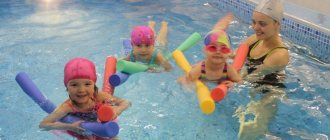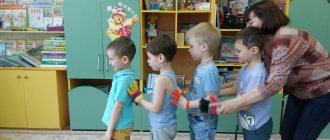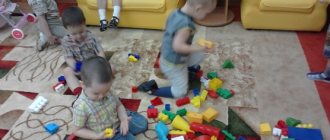Definition 1
The preschool education system is a complex of educational institutions, training programs, management frameworks, patterns and principles for the implementation of educational activities at the preschool age stage of personality development.
The preschool education system plays a key role in the development of the personalities of the younger generation. Therefore, careful organization of training at this level and the construction of an optimal system focused on the implementation of the concept of education at the current stage of development of the social environment and meeting the needs of society for educational services are required.
Figure 1. Preschool education system in the Russian Federation. Author24 - online exchange of student work
Are you an expert in this subject area? We invite you to become the author of the Directory Working Conditions
Model of a modern preschool education system
At the present stage of development of society, the preschool education system includes the following blocks, the functioning and development of which are interconnected and interdependent:
- Principles of building preschool education. Currently, the preschool education system is based on the following principles:
- The principle of dynamism. It involves the dynamic development of educational and upbringing processes in accordance with the progress of society and the intensity of its processes;
The principle of variability of organizational forms. It means that preschool educational organizations operating in Russia can be presented in different forms, aimed at meeting various educational needs. At the moment, there are many types of educational institutions and there is variability in the educational services provided;
- The principle of flexibility. It involves a quick response to changes occurring in society, the needs of society for education and the needs of the individual;
- The principle of integrity of the educational process. It is associated with the orientation of educational programs of various types and types towards the development of the personality of each individual child.
- Preschool education programs. They are characterized by the variability of their content and directions of development while focusing on common educational goals and objectives.
- Pedagogical technologies used in the preschool education system. They are related to the implementation of preschool education programs and the implementation of an individual approach to each pupil. Therefore, pedagogical technologies are characterized by variability, flexibility and dynamic use.
- Subject-developing spatial environment. It is a necessary condition for the full development of the younger generation, and therefore, an important component of the preschool education system, without which its full and productive functioning is impossible.
- Teaching staff. The qualifications of modern preschool teachers require their continuous professional growth and development. This is necessary for the implementation of variable educational programs in the preschool educational system and the use of variable pedagogical technologies.
Finished works on a similar topic
Course work Modern system of preschool education 440 ₽ Abstract Modern system of preschool education 260 ₽ Examination Modern system of preschool education 210 ₽
Receive completed work or specialist advice on your educational project Find out the cost
The modern model of preschool education involves the use of variable educational programs that determine the content of the preschool stage of education, the focus of activities, the degree of complexity and guarantee the full and comprehensive development of the younger generation.
The main educational program of a preschool educational institution determines the specifics of building the life activities of children within the walls of a preschool institution, focused on the comprehensive development of each pupil. This is implemented through the inclusion of varied children’s activities in the educational program, presented in the following forms:
- Classes of different directions are a form of educational activity for preschoolers.
- Unregulated types of activity are a form of work that is not included in the regulations of the preschool educational institution.
- Free time – providing children with independent time, socializing in groups, playing and interacting with peers.
At the present stage of development of society, the model of preschool education is based on public-private partnership in the provision of educational services. This means that there are preschool-type educational institutions under the jurisdiction of state authorities, and there are private preschool institutions. Each institution has the right to use its own educational program, adapting to the needs of different families.
Figure 2. Features of modern preschool education. Author24 - online exchange of student work
Article “The role of preschool pedagogy in modern conditions”
The role of preschool pedagogy in modern conditions
Preschool childhood is a period of maturation, the active formation of the individuality of each child, active knowledge of the surrounding reality, and emotional attitude to the world. All over the world there is a recognition of childhood as a valuable, original period that determines the entire future life. Modernity poses many challenges related to the questions of how to develop, educate, and teach preschool children.
The main tasks of preschool pedagogy are:
-research of historical trends in the development of views on preschool childhood and preschool pedagogy;
-studying foreign experience in preschool education and upbringing; development of didactic foundations for preparing a child for school in different periods of preschool childhood;
-study of pedagogical patterns of formation and development of mental properties, cognitive and emotional-volitional processes in a child in preschool age; development of theoretical foundations for raising a preschool child in the process of learning, communication, and educational games;
-studying the ways and conditions for effective intellectual and physical development of preschool children;
-the current state of the organization of preschool education in Russia.
In a preschool institution, the foundations of a healthy lifestyle are laid, since the conditions necessary for the physical, mental, spiritual, moral and social development of children are created here. The modern system of domestic preschool education is built on the principles of dynamism, variability of organized forms, flexible response to the needs of society and the individual, and is characterized by the emergence of new types of educational institutions for children and a variety of pedagogical services.
Among the factors influencing the effectiveness and quality of education of children in a preschool educational institution, an important role belongs to the educational program. It is a guideline for the creative activity of educators: it determines the content of the educational process in a preschool educational institution, reflects the worldview, scientific and methodological concept of preschool education, and records its content in all main areas of child development.
The level of psychological and pedagogical literacy of parents has increased significantly. Their requirements for the education, upbringing and development of children in the preschool period have changed. Parents want to be active participants in the pedagogical process; they are ready to participate in the implementation of the preschool education program. Currently, parents are given the right to independently determine when their child starts school. At the present stage, the first place is not teaching a preschooler to read, write, count, foreign language, etc., but the formation of functional readiness for schooling and social maturity. Thus, in recent years, a new term “pre-school education” has come into use.
Among the latest legal documents in the field of education of preschool children, the Federal State Educational Standard for Preschool Education is the main one. The introduction of the Federal State Educational Standard for Preschool Education, based on a scientifically verified strategy for the modernization of preschool education, makes it possible to determine the importance of preschool education in the general continuous education system. It sets new coordinates for the development of preschool education and identifies criteria for its quality. Let the child play enough, create a decent developmental environment for him, help him develop in it, while not being above the child, but together, next to him. Develop motivation in a child - “I want to find out!” Allowing children to speak, think independently, look for answers to questions, and instill in children a thirst for discovery in acquiring knowledge - this is the main task of preschool education, which has now become the first stage of education.
A modern preschool teacher must be competent:
- in organizing events aimed at strengthening the health of pupils and their physical development;
-in the organization of various types of activities of students;
- in interacting with parents (legal representatives) of students and employees of the educational organization;
-in methodological support of the educational process;
-in the implementation of information and communication technologies;
- in ensuring inclusive approaches in working with preschoolers with special educational needs, including those with disabilities.
The use of information and computer technologies in preschool education allows teachers to change the content, apply new non-traditional methods and organizational forms of teaching. The opportunities provided by network electronic resources allow us to solve problems that are relevant for specialists in the preschool education system:
-Additional Information;
-various illustrative material;
-opportunity to disseminate new methodological ideas and teaching aids.
The use of Internet resources allows teachers to take part in interregional and international conferences, webinars, seminars and competitions. It is very important to form an information culture in children. When using information resources in working with preschoolers, it is necessary to be guided by the “Methodological Recommendations” on limiting in educational organizations students’ access to types of information distributed via the Internet that are harmful to the health and (or) development of children, and also do not correspond to the objectives of education.
One of the most important tasks of modern preschool pedagogy is caring for the health of the child. Modern society increasingly places demands on the physical, mental, and personal development of children, and tries to preserve the health and intelligence of the nation at the present stage. There is an increasing need for preschool teachers to implement technologies aimed at preserving and strengthening the health and development of the psychophysical potential of preschool children, intensifying motor activity, which will ensure the successful adaptation of children to the multidirectional loads of school education. The implemented technologies help to form strong motivation for a healthy lifestyle among preschoolers, their parents, and teachers.
In the Federal State Educational Standard, preschool education reveals the essence of motor activity implemented in the direction of “Physical Development”. Modern health-saving technologies reflect two lines of health-improving and developmental work: introducing children to physical education; use of developmental forms of health-improving work with children. Their goal in preschool education is to ensure a high level of real health for children and foster physical education, allowing preschoolers to independently solve the problems of a healthy lifestyle and safe behavior.
Particular attention should be paid to the system of interaction between a preschool educational institution and a school in the context of continuous education. Preparing a child for school begins long before he graduates from a preschool educational institution. The child's first teacher is the teacher. The Federal State Educational Standard for Preschool Education defines a set of mandatory requirements for preschool education and determines the main guidelines for the implementation of the educational program. The Program's targets serve as the basis for the continuity of preschool and primary general education. One of the objectives of the “Federal State Educational Standard of Preschool Education” is to ensure the continuity of the goals, objectives and content of education implemented within the framework of educational programs at various levels (continuity of the main educational programs of preschool and primary general education). The Federal Law “On Education in the Russian Federation” notes that educational programs of preschool education are aimed, among other things, at achieving the necessary and sufficient level of development for children to successfully master educational programs of primary general education.
The development of education can be carried out on its own, but is effective only if it is managed and improved in management processes, based on a scientific approach. Reform plays a significant role in improving education management. And this is the main factor in education management today. The concept of “quality of preschool education” is analyzed based on three different aspects. In the national aspect, the quality of preschool education can be determined by the measure of its adequacy to the socio-economic conditions of society. Here, the quality of preschool education comes into contact with such aspects as the standard of living, the economic potential of the country, etc. In the social aspect, it is determined by the compliance of educational services with the real request of parents. The quality of preschool education in the pedagogical aspect may mean the implementation of the principle of variability in education, the transition to personality-oriented interaction between the teacher and children. The concept of “quality” is multifaceted and is interpreted differently from the perspective of each participant.
For children, this is learning in a fun way for them.
For parents, this means effective education for children, that is, training according to Programs that prepare their children well for school.
For teachers, this is a positive assessment of their activities by the head of the preschool institution and parents.
The period from birth to entry into school is the age of the most rapid physical and mental development of the child, the initial formation of mental and physical qualities necessary for a person throughout his life. In other words, educating a preschool child is like laying the foundation of a huge building. It is on this basis that character, skills, and abilities will be built and developed in the future. Of course, it is worth making sure that this foundation is strong and reliable.
Variability of preschool education programs
The modern education system is represented by six types of preschool educational institutions, therefore, educational programs aimed at preschool educational institutions are presented in various options. At the same time, the Federal State Educational Standards for Educational Institutions have been established, regulating the implementation of educational programs of preschool educational institutions and putting forward requirements for their development.
All preschool education programs are divided into two types:
- Comprehensive programs are general developmental programs focused on the implementation of education in all main areas of child development: physical, social, speech, moral, cognitive, artistic and aesthetic, communicative, personal. These programs include activities to reveal the child’s basic abilities, activate his creative potential, cognitive abilities and develop special types of children’s activities characteristic of a specific age group: subject, play, art, theater, music, design.
- Partial programs are specialized programs focused on the development of preschool children in a specific area. These could be health conservation programs, remedial education programs, environmental and patriotic development programs, programs for mastering non-standard activities (early reading, handicrafts, cooking, etc.).




